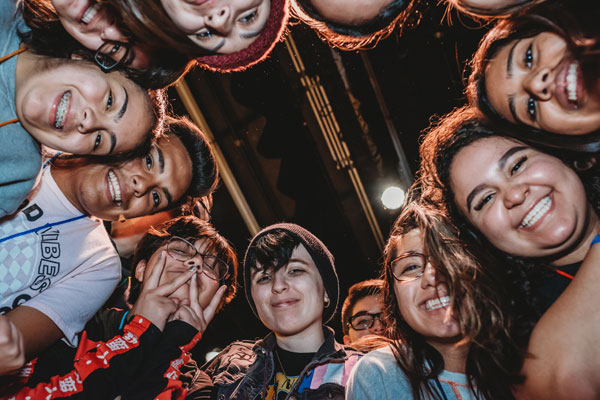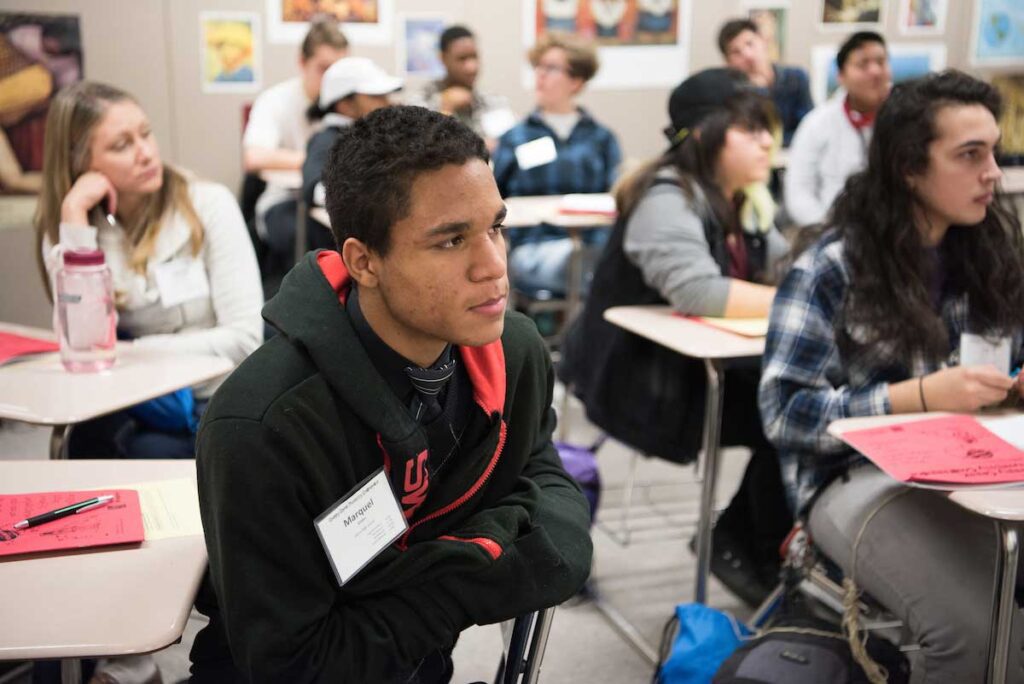We empower young people to learn about economic inequality; strategies and resources to address these challenges; and their role in creating economic justice for all.

Jump to a section:
Important Economic Justice Terms
- Poverty: poverty is hunger. Poverty is lack of shelter. Poverty is being sick and not being able to see a doctor. Poverty is not having access to school and not knowing how to read. Poverty is not having a job, is fear for the future, living one day at a time. Poverty is powerlessness, lack of representation and freedom. (World Bank)
- Minimum wage: the lowest legal wage companies can pay workers. (The Balance)
- Food pantry or food bank: a community-based program that collects and safely stores food and household products for free distribution to low-income and needy members of the community. (Second Harvest)
- Gentrification: the process whereby higher-income households move into low-income neighborhoods, escalating the area’s property values to the point that displacement occurs. In addition to changes in economic class, gentrification often involves a change in a neighborhood’s racial and ethnic composition, which can further alter an area’s characteristics, potentially leading to community tension. (Urban Institute)
- Displacement: low-income households relocate due to new development or gentrification in their neighborhood once they can no longer afford to remain due to higher rents, appreciated taxes, tenant harassment, or the withholding of services. (Urban Institute)
- Food desert: an area in which someone does not have access to a food source, such as a supermarket, nearby. (US Department of Agriculture)
- In urban areas, an area with no ready access to a store with fresh and nutritious food options within one mile.
- In rural America, living 10 miles or more from the nearest supermarket.
- Economic justice: a moral economy that prioritizes the general welfare, workers, and families, securing their basic needs and creating the conditions for them to thrive. (Poor People’s Campaign)
Types of Poverty
The term poverty can mean many things; we appreciate Eric Jensen‘s approach that outlines six types of poverty. Note families or individuals can be affected by one or multiple types of poverty depending on their situation.
- Situational poverty is generally caused by a sudden crisis or loss and is often temporary. Events causing situational poverty include environmental disasters, divorce, or severe health problems.
- Generational poverty occurs in families where at least two generations have been born into poverty. Families living in this type of poverty are not equipped with the tools to move out of their situations.
- Absolute poverty, which is rare in the United States, involves a scarcity of such necessities as shelter, running water, and food. Families who live in absolute poverty tend to focus on day-to-day survival.
- Relative poverty refers to the economic status of a family whose income is insufficient to meet its society’s average standard of living.
- Urban poverty occurs in metropolitan areas with populations of at least 50,000 people. The urban poor deal with a complex aggregate of chronic and acute stressors (including crowding, violence, and noise) and are dependent on often-inadequate large-city services.
- Rural poverty occurs in nonmetropolitan areas with populations below 50,000. In rural areas, there are more single-guardian households, and families often have less access to services, support for disabilities, and quality education opportunities. Programs to encourage transition from welfare to work are problematic in remote rural areas, where job opportunities are few. The rural poverty rate is growing and has exceeded the urban rate every year since data collection began in the 1960s.
How Economic Injustice Shows Up
- More than 95 million Americans (nearly 30 percent of the total population) are either in poverty or considered “low-income” (below twice the poverty line), using the Official Poverty Measure. That number rises to 43.5% (over 140 million people) when using the Supplemental Poverty Measure (SPM), which takes into account federal assistance resources as well as critical out-of-pocket expenses. (Poor People’s Campaign)
- The U.S. current national minimum wage is $7.25 per hour; at 40 hours per week for 52 weeks, the minimum wage translates to $15,080 a year. If someone were trying to support a family by making minimum wage, they would qualify for federal poverty assistance. Many states and cities have their own minimum wage. Although the minimum wage protects workers from exploitation, it hasn’t kept pace with inflation. If it had, it would now be $10.41 an hour. If it had kept up with executive-level pay increases, it would be $23/hour. (The Balance)
- Seventeen out of every 10,000 people in the United States were experiencing homelessness on a single night in January 2019 when the US Department of Housing and Urban Development last counted. This translates to over half a million Americans living without permanent shelter on a nightly basis. (National Alliance to End Homelessness)
- It’s estimated there are more than 23 million people, more than half of them low-income, living in food deserts. Lack of access to healthy foods and consequent poor diet leads to higher levels of obesity and chronic conditions like diabetes and heart disease. And with recent cuts to the food stamp program—an average of $90 a month per recipient—achieving a healthy diet will be a lot more difficult for the poor. (Newsweek)
Economic Justice Leaders Who Inspire Our Work
Here’s a list of folks who are leading the conversation on economic justice today, whether on the local or national level. They inspire and inform our work. Follow them on social media, or seek out opportunities to hear them speak to dig deeper on these issues.
YCD Workshops on Economic Justice
YCD has a curated library of over 60 workshop guides on every aspect of inclusion and justice work for middle and high school youth to explore in their own youth-led club or group — with new workshops being published every month. These guides can also be used by educators as part of their in-school curriculum, where interested.
Below is a free sample workshop created by YCD on the topic of economic justice, available for anyone to use and download.
Gentrification
Watch a video on gentrification, then hold an engaging group discussion on the impact gentrification has had on our communities. Consider whether or not gentrification would happen in an economically just world.
Other topics available as downloadable workshop guides or offered at YCD conferences/events include:

Exploring Social Class
Engage in a group discussion on social class, where it came from, and what it looks like in society. Work together to identify ways that social class impacts our life experiences and our efforts to advance social justice.
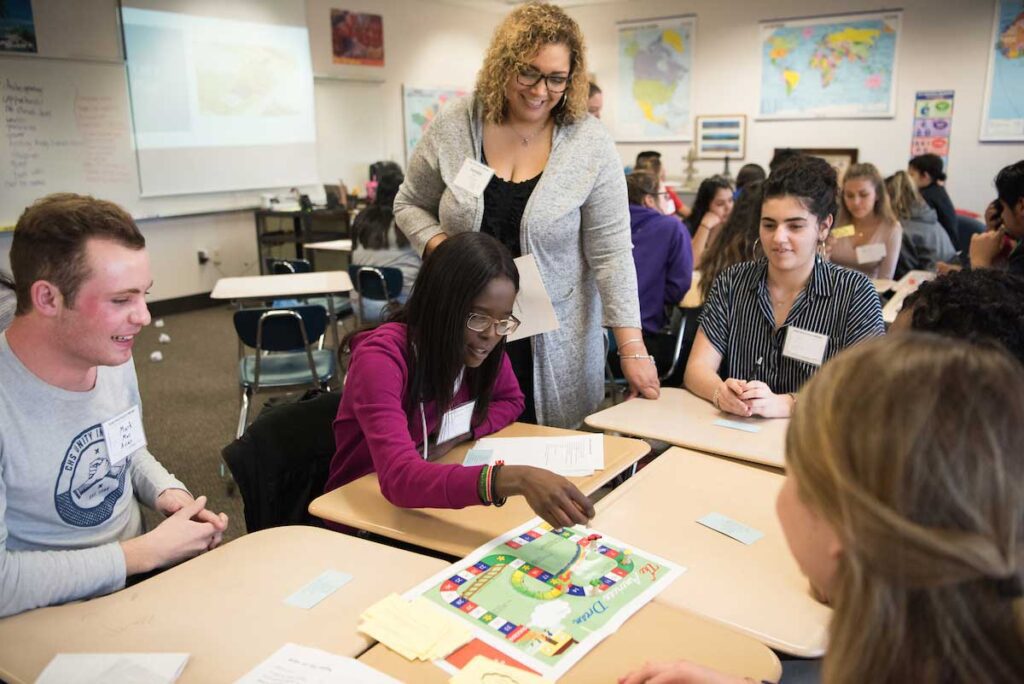
The American Dream: How do You Fit In?
In this workshop we will explore privilege, and the many levels of privilege that we may have, by playing, “The American Dream” game. After playing the game, students will have a discussion around privilege, how you use it to help yourself and how can you use it to help others.
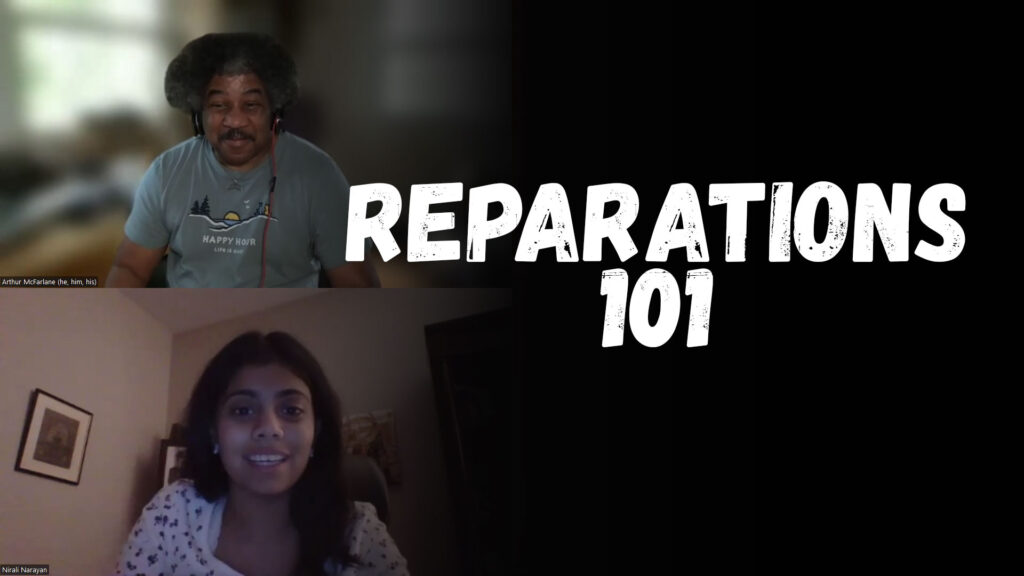
Reparations 101
We explore the history of Black Americans in this country and the inequities they have faced, and then turn to discuss reparations — or reparative solutions — being offered to address this history of oppression.

How to Pay for College without Going Broke
Is paying for college scaring you from applying? Does the financial aid process freak you out? In this session, we talk about in-state tuition, grants, scholarships and loans, and share some creative ways to save money and pay for college.
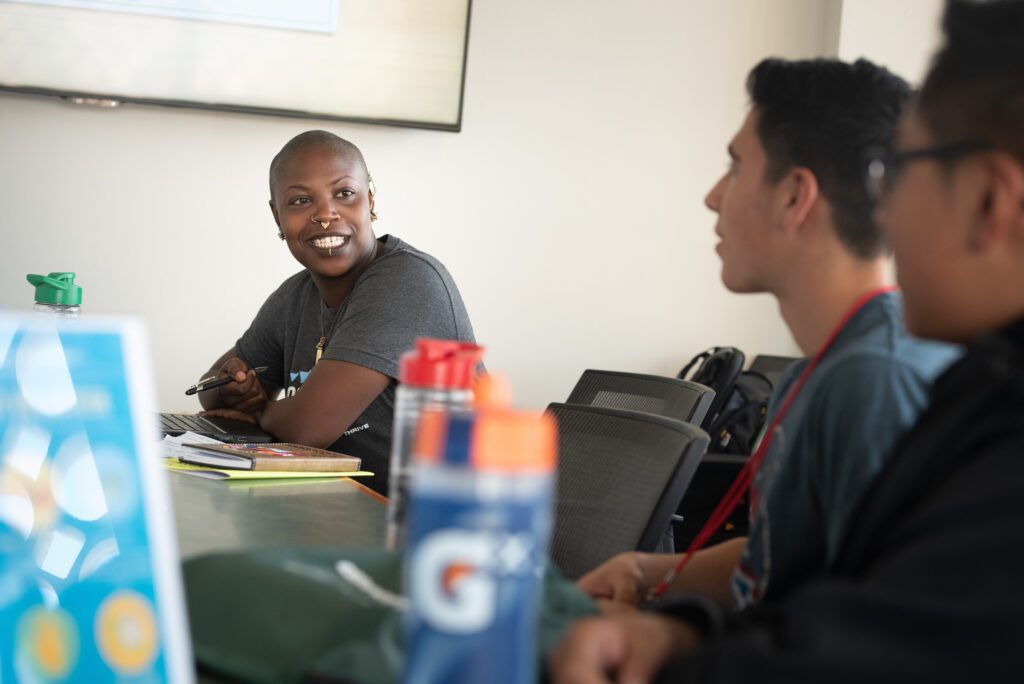
How Much Does it Cost to Live (and Survive) in My State?
How much does rent cost? Childcare? Food and gas? Here’s your chance to balance and budget and understand what it will take to survive as an adult once you’ve graduated from high school or college.
To experience these workshops, YCD events, and much more, start or join a YCD chapter!
Videos to Explore Economic Justice
Building Community with the Unhoused
Teens Talk podcast host Lameese Makkawi is joined by Katie Randall of the Boulder Shelter for the Homeless, to discuss what it’s like to be unhoused, and tangible ways to help the unhoused community.
Reparations 101
In this webinar we explore the history of Black Americans in this country and the inequities they have faced, and then turn to discuss reparations — or reparative solutions — being offered to address this history of oppression.
Understanding Youth Homelessness
In this webinar we explore what causes young people to become homeless in the first place, learn about their experiences while unhoused, and also discuss strategies that help young people find housing again.
The Impact of COVID-19 on Low-Income Families and the Homeless
While we live through a pandemic and health emergency, the economic impacts of COVID19 have been huge, especially for low-income families and the homeless. How are people surviving during these trying times? What more can government do to support low-income families? How can we all combat classism?
Stay up to date for future student-generated videos on this topic and more by subscribing to YCD’s YouTube channel.
Economic Justice Books for Youth
Here is a list of recommended books for students and teens that explore and address economic justice. You can find free e-books or your local library using OverDrive.com.
Economic Justice Books for Educators, Parents and Adults
And this list is for teachers, educators and adults looking for guidance on economic justice within the classroom or school system or beyond.
Movies and Shows Addressing Economic Justice
Below are movies and shows that address economic justice topics in meaningful and compelling ways.
Podcasts on Economic Justice
Here is a list of recommended podcasts you can download and follow to explore economic justice work in more detail.
Ideas for Local Action to Address Economic Injustice
- How does food insecurity show up in your community? Use the US Department of Agriculture’s food desert locator to investigate what communities lack access to healthy food. Investigate the racial, socioeconomic and other statistics for the neighborhoods identified as food deserts. Contact your city council members or state representatives to ask what they are doing on food insecurity and food deserts, and pressure them for action.
- Start a local, student-driven campaign to erase school lunch debt, so that all students can eat. Learn more about this movement from the Healthy School Meals for All campaign. And, while you’re at it, do a nutritional analysis of the food being provided in school, and work with administration to see what improvements can be made, so that school lunch is both free and healthy for students.
- If your community is in an existing food desert, get in touch with any local farmers markets to see if they are donating leftover produce to local hunger relief agencies. If you don’t have an existing food bank in your community and there is need — start one! Here are tips on how to start a food pantry.
- Volunteer for a local food pantry or food bank. Don’t just put in the hours — engage and learn from the staff about what efforts they are taking locally to address food insecurity, and ask how you can get involved.
- If you live in a larger city, how has gentrification shaped your community to date? Are there communities facing displacement right now? Launch a group project to conduct interviews of people who are facing gentrification to learn more about the history of these neighborhoods. With permission, film these interviews to make a short documentary that can be shared with city council members or community leaders to put a human face and stories to the problem. Put on a film screening at your school. Press government officials for tangible actions on fighting gentrification and displacement.
- Prepare inexpensive care packages that can be distributed to homeless individuals when you encounter them. Conduct a fundraiser at your school to finance the initiative; most care packages can be created for under $20 per person. Anyone under 18 years old should have a parent, teacher or experienced homeless advocate accompany them to distribute care packages, or you can drop off the packages to an existing homelessness agency to distribute on your behalf. Watch this video to learn from a couple in Tacoma, Washington that regularly hand out homeless care packages.
- Research what the minimum wage is for your city and state, and see how that compares to the average cost to live in your community. The Living Wage Calculator from MIT can help in this process. Reach out to local organizations working to increase the minimum wage to see how you can get involved. It may be easier and more effective to work on making changes within your city rather than waiting for action at a state or national level depending on your location.
Do you have a suggestion of an addition or resource for this page? Share your idea with us.
